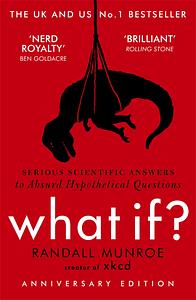You need to sign in or sign up before continuing.
Take a photo of a barcode or cover
3.76k reviews for:
What If?: Serious Scientific Answers to Absurd Hypothetical Questions
Randall Munroe
3.76k reviews for:
What If?: Serious Scientific Answers to Absurd Hypothetical Questions
Randall Munroe
xkcd is one of my favorite comics, even if I don't always understand them, so when I saw this book I knew I had to read it! I thoroughly enjoyed reading this book, even if it did take me almost three years to get through it. I had to take a break because it is a lot of science to digest at once and never got back to it until this year. I found it was a great book to have around when I just had a few minutes to read. And, I love the way it ends!
However, I did take issue with one chapter: Sunset on the British Empire. According to the chapter, the sun will eventually "set" with an eclipse. However, in Longest Sunset (pg. 228) he defines a setting sun as going below the horizon. Based on that chapter, the sun won't set on the Empire unless they lose the islands because an eclipse isn't a sunset.
However, I did take issue with one chapter: Sunset on the British Empire. According to the chapter, the sun will eventually "set" with an eclipse. However, in Longest Sunset (pg. 228) he defines a setting sun as going below the horizon. Based on that chapter, the sun won't set on the Empire unless they lose the islands because an eclipse isn't a sunset.
And this is the book where I realized I hate science writing. Or more accurately, math writing. Or more accurately, absurdist humor mixed with math writing and science writing. I love Wil Wheaton and would love to hear him narrate another audiobook, but this book was not my jam at all. The answers are not serious or scientific - most of the time, the questions were the most interesting part, and then the author changed the question as he answered them.
One of the Amazon reviews gives this example:
Obviously that reviewer LOVED the idea, but I found it annoying. There were a few questions I liked, most notably the one about draining the ocean and what to do if you and someone else were the only people on earth and needed to find one another, but those were the least math-oriented questions in the book. Of course a history teacher would like a geography and strategy question.
If I didn't have a road trip I needed to fill I probably never would have finished it. As it was, it made decent background noise, and now I know I hate math in every form, even literary.
One of the Amazon reviews gives this example:
Some simply don't have fun answers, but he takes them a step further to make them fun! Similar to Mythbusters, where the see what would have to happen to get the desired result. What happens if everyone on earth shined a laser pointer at the moon? Nothing noticeable. What about if everyone on the earth shined a megawatt laser at the moon? something much more interesting.
Obviously that reviewer LOVED the idea, but I found it annoying. There were a few questions I liked, most notably the one about draining the ocean and what to do if you and someone else were the only people on earth and needed to find one another, but those were the least math-oriented questions in the book. Of course a history teacher would like a geography and strategy question.
If I didn't have a road trip I needed to fill I probably never would have finished it. As it was, it made decent background noise, and now I know I hate math in every form, even literary.
I don't usually read popular science books, but I'm a fan of scientific or academic comics (including the ones done by the author) - it just helps to put a bit of fun into the academic world. This particular book, however, was not a bad read. People have really outdone themselves sending in really weird questions. And the author, on his part, has sometimes gone out of the way to give decent and comprehensible answers. It helps that the book has short chapters and you can pick it up anytime and read any one of them. It might give you some weird insights to impress your friends at the next party.
Was it funny? I'd say yes. But more than once I felt that the footnotes were the funniest (however, I'm not sure everyone would get the humor). How much do I remember? Sorry, but not much. I guess, it just means that I can pick it up again in a little while and re-read some bits. Illustrations were great, though. And I liked that it didn't focus just on physics.
Was it funny? I'd say yes. But more than once I felt that the footnotes were the funniest (however, I'm not sure everyone would get the humor). How much do I remember? Sorry, but not much. I guess, it just means that I can pick it up again in a little while and re-read some bits. Illustrations were great, though. And I liked that it didn't focus just on physics.
Would recommend as an audiobook. Funny commentary and some scientific insights. A few outdated things to due publication date, would love an updates version!
funny
informative
lighthearted
fast-paced
funny
informative
lighthearted
fast-paced
Strong in parts, verbose in others. I love the witty footnotes and humor Munroe sprinkles in, but I found myself not as interested in the material as I thought I’d be.
It’s a decent read, but wouldn’t recommend unless the reader is fascinated with space and/or NASA.
It’s a decent read, but wouldn’t recommend unless the reader is fascinated with space and/or NASA.
The premise of WHAT IF is a good one, and for the most part, its execution is also good. Randall Munroe doesn't get bogged down in technical details, and he's as gung-ho to be absurd as the people asking the questions. He is just as willing to dive out of the realm of reality/possibility as the absurd hypothetical questions.
With this said, in book form, the content suffers. These questions are best approached in bite-size portions. Otherwise, you run the risk of letting the absurd feel normal. The question "what would happen if a pitcher threw a ball at nearly the speed of light" is hilarious (and the answer is great), but when it is set up against similarly outrageous questions, the novelty and absurdity of it is diminished.
So, if you plan on reading this, stretch it out. Take breaks from it. It's fun, but too much of a good thing is a, well, you know.
With this said, in book form, the content suffers. These questions are best approached in bite-size portions. Otherwise, you run the risk of letting the absurd feel normal. The question "what would happen if a pitcher threw a ball at nearly the speed of light" is hilarious (and the answer is great), but when it is set up against similarly outrageous questions, the novelty and absurdity of it is diminished.
So, if you plan on reading this, stretch it out. Take breaks from it. It's fun, but too much of a good thing is a, well, you know.
People ask some genuinely weird, but interesting questions. Some chapters that I found particularly interesting - A Mole of Moles, Soul Mates, Little Planet, Yoda, No More DNA, and Lego Bridge.
Fun and interesting! I’m a sucker for useless knowledge, and while some of this knowledge went over my head, it was still given in a fun, enjoyable way.




